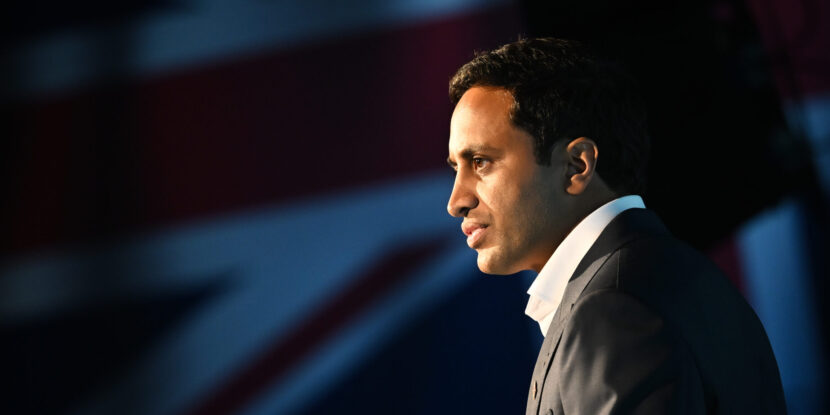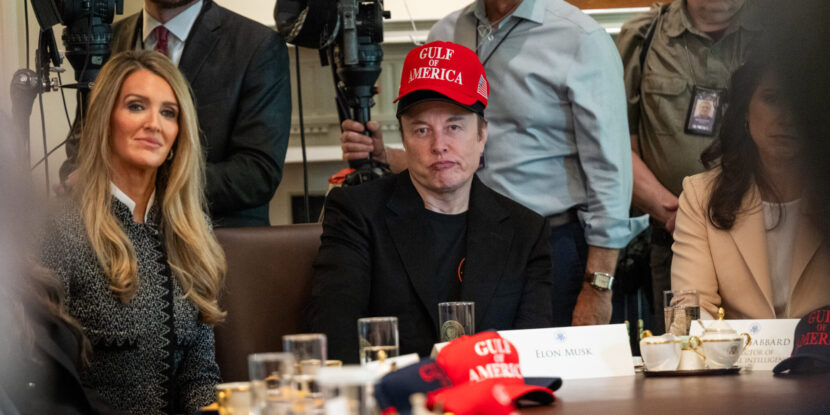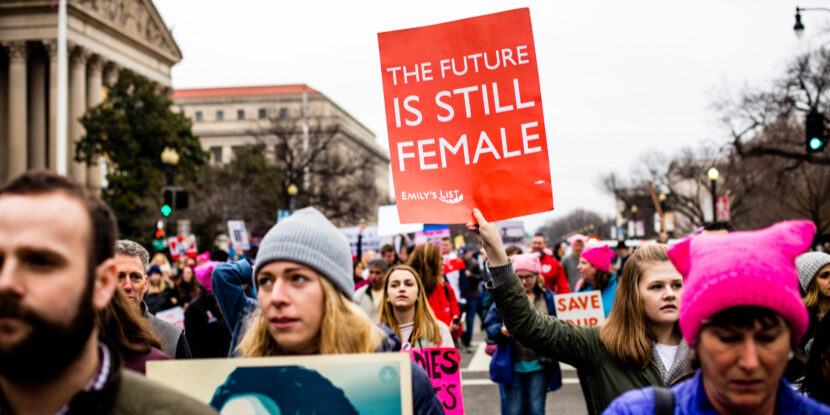
PULSE POINTS:
❓What Happened: Zia Yusuf resigned as chairman of Nigel Farage’s Reform Party, after callings its newest Member of Parliament (MP) “dumb” for advocating a burka ban.
👥 Who’s Involved: Zia Yusuf, Reform Party, Nigel Farage, and Sarah Pochin.
Your free, daily feed from The National Pulse.
📍 Where & When: Announced via X (formerly Twitter) on June 5, 2025.
💬 Key Quote: “I no longer believe working to get a Reform government elected is a good use of my time,” Yusuf said.
⚠️ Impact: Yusuf’s exit paves the way for significant changes to Farage’s top team.
IN FULL:
Zia Yusuf has announced his resignation as chairman of Nigel Farage’s Reform Party, hours after publicly criticizing the party’s newest Member of Parliament (MP) for pushing for a burka ban.
“[Eleven] months ago I became Chairman of Reform. I’ve worked full time as a volunteer to take the party from 14 to 30 percent, quadrupled its membership and delivered historic electoral results,” Yusuf said in a post on X (formerly Twitter). “I no longer believe working to get a Reform government elected is a good use of my time, and hereby resign the office,” he added.
Yusuf, a Muslim businessman, had criticized Sarah Pochin MP, after she had grilled Prime Minister Sir Keir Starmer on introducing a ban on the Islamic burka in the House of Commons.
Yusuf said on Wednesday that banning the burka was not party policy and Pochin was stupid for asking Starmer the question, writing that it was “dumb for a party to ask the PM if they would do something the party itself wouldn’t do.”
The National Pulse Editor-in-Chief Raheem Kassam, a former advisor to Nigel Farage, suggested in March that the Reform leader should consider replacing Yusuf, who was previously at the center of a spat with now-former Reform MP Rupert Lowe.
“Farage isn’t a dictator. He’s one of the most reasonable people in politics. He’s moved aside when it made sense, and he’s returned when asked,” Kassam said of Farage’s leadership style in comments to the British press.
“He’s also a meritocrat. If someone comes along who can run the party better than its current chairman, or if a deputy could help augment the work, he’d be all over it,” he continued, adding: “The problem is everyone has his number and any time anyone has a problem in the party they immediately call Nigel, and drag him into their fights. If he doesn’t side with them, or tries to stay neutral, they lash out. I’ve seen it a thousand times.”
“If anything, he needs a militant chief of staff to police his time and keep him above the fray. This is the next Prime Minister we’re talking about now… They need to get his team right and support him wholeheartedly. No one has put more into this movement than him,” Kassam concluded.
Farage has offered a magnanimous response to Yusuf’s departure, writing that he is “genuinely sorry that Zia Yusuf has decided to stand down as Reform UK Chairman” as he was “a huge factor” in the party’s recent triumph in England’s local elections.
“Politics can be a highly pressured and difficult game and Zia has clearly had enough. He is a loss to us and public life,” he added.
This story is developing…

President Donald J. Trump has said he is “very disappointed” in Elon Musk, the former Department of Government Efficiency (DOGE) frontman, who has been attacking the Trump-backed “one big beautiful bill.”
“I’m very disappointed in Elon; I’ve helped Elon a lot,” President Trump told the press on Thursday. The America First leader noted Musk has not “said [anything] bad about me, personally,” but said he was “sure that’ll be next.”
Your free, daily feed from The National Pulse.
So far, Musk has attacked the “one big beautiful bill” only as a “Congressional” spending bill. Still, it is inextricably linked to the President, fulfilling many of his key campaign pledges, including the extension of his 2017 tax cuts, new cuts to taxes on tips, overtime, and social security, and increased spending on defense and border security.
Musk believes it increases spending unacceptably, but the administration argues it actually achieves substantial spending cuts. Moreover, because it is a reconciliation bill, there is a great deal of spending it cannot touch, and further, separate legislation to cut spending is pending.
During his remarks to the press, Trump suggested Musk “is upset because we took the EV mandate which was a lot of money for electric vehicles,” such as those produced by Musk’s Tesla firm.
“Whatever,” Musk irately responded on his X (formerly Twitter) platform, complaining: “Keep the EV/solar incentive cuts in the bill, even though no oil & gas subsidies are touched (very unfair!!), but ditch the MOUNTAIN of DISGUSTING PORK in the bill.”
WATCH:
NOW – Trump says he is “very disappointed” with Elon Musk. pic.twitter.com/aBe85scHPf
— Disclose.tv (@disclosetv) June 5, 2025
This story is developing…
show less
President Donald J. Trump has said he is "very disappointed" in Elon Musk, the former Department of Government Efficiency (DOGE) frontman, who has been attacking the Trump-backed "one big beautiful bill." show more

President Donald Trump signed a proclamation restricting immigration from nearly 20 countries deemed high-risk due to terrorism ties and visa overstays.
The details: Trump’s proclamation includes 19 countries—twelve with a full ban and seven with partial bans.
Your free, daily feed from The National Pulse.
- Full ban: Afghanistan, Burma, Chad, Congo, Equatorial Guinea, Eritrea, Haiti, Iran, Libya, Somalia, Sudan, Yemen
- Partial ban: Burundi, Cuba, Laos, Sierra Leone, Togo, Turkmenistan, Venezuela
Why? When Trump returned to office in January, he issued Executive Order 14161, which ordered U.S. agencies to assess security risks from high-risk nations. They found that the 19 banned countries have:
- large-scale presence of terrorists
- high rates of visa overstays
- an inability to verify identities
- poor record-keeping of criminal histories
Some exemptions: The order carves out some exemptions for green card holders, existing visa holders, and national interest cases.
Zoom out: In a video message announcing the travel ban, Trump cited the recent terrorist attack in Boulder, Colorado, by an illegal alien who overstayed his visa in 2023.
show less

PULSE POINTS:
❓What Happened: Following a court ruling declaring rejection of illegals at the border unlawful, German police fear they may face prosecution for carrying out their duties.
👤Who’s Involved: German federal police, Berlin Administrative Court, federal police union chairman
Your free, daily feed from The National Pulse.
Andreas Roßkopf, and Interior Minister Alexander Dobrindt.
🧾Key Quote: “The directive must be implemented, but the liability of colleagues must be explicitly removed in the end,” said Roßkopf.
⚠️Fallout: The ruling could halt Germany’s belated attempts to regain some control of its borders, as it remains a major destination for asylum seekers in Europe.
📌Significance: Germany could face yet more mass migration, which has already massively shifted the demographics of the country and is producing enormous strain on social systems.
IN FULL:
Police in one of Europe’s largest countries now fear they may be subject to prosecution for enforcing border policies after a court declared that the deportation of several Somali nationals at the border was illegal. The Administrative Court of Berlin in Germany declared that the rejection of three Somalis at a border control at Frankfurt train station was illegal, contrary to the government’s new border control policy.
Federal police union chairman Andreas Roßkopf now fears that police could personally face prosecution for enforcing the border controls. “Of course, it is a case-by-case decision at first, but it remains to be noted that these are cases that we have every day, and so there is now a certain uncertainty among colleagues,” he said. “The directive must be implemented, but the liability of colleagues must be explicitly removed in the end,” Roßkopf added.
German Interior Minister Alexander Dobrindt ordered stricter border controls to be implemented in May, but the ruling could undo those orders. Others in the federal government have suggested the policies may be reworked to comply with the ruling and European Union (EU) laws.
Germany has long been the major destination in Europe for asylum seekers, although this year it appeared that France had surpassed Germany for the number of overall applications. Before the more restrictive border policy, Germany saw several mass stabbing attacks carried out by asylum seekers from countries like Syria and Afghanistan. The country has seen several terrorist attacks as well, many of which have been committed by asylum seekers who have arrived since the 2015 migration crisis.
Migration has also rapidly changed the country’s demographics, with around one-third of young adults in Germany now coming from migration backgrounds.
show less

PULSE POINTS:
❓What Happened: Pew Research data shows an estimated 50 percent of liberal women under the age of 30 say they have a mental health condition.
👥 Who’s Involved: Pew Research, Nate Silver, young Democrat women, the Democratic Party, and male voters.
Your free, daily feed from The National Pulse.
📍 Where & When: The Pew data is from 2020 but has resurfaced as part of an ongoing debate about the Democratic Party’s collapsing support among male voters, with Silver posting about the phenomenon on June 2, 2025.
💬 Key Quote: “I think an underrated factor in the ‘how can Democrats win back young men’ debate is the effects of personality, which differ especially among younger voters,” said election guru and statistician Nate Silver.
⚠️ Impact: Silver and others point to the neurotic and anxious nature of women in the Democratic Party as being partially responsible for the alienation of male voters and believe party leaders should cater less to the demographic in future elections.
IN FULL:
Around 50 percent of young, liberal women under 30 say they have been diagnosed with a mental health condition, according to data from Pew Research. The statistic has emerged as a critical inflection point in the post-2024 election autopsy of the Democratic Party and its cratering support among male voters, especially young black and Hispanic men.
Election polling guru and statistician Nate Silver has pointed to the Pew data on mental health, broken down by gender and partisan affiliation, as evidence that the Democratic Party’s penchant for catering to its predominantly female and progressive political base has played a significant role in its loss of male political support. Silver, in a post on X (formerly Twitter), contends that the Democratic Party has come to reflect the neurosis and anxiety expressed by its young female voting base, which alienates and turns off most men.
“I think an underrated factor in the ‘how can Democrats win back young men’ debate is the effects of personality, which differ especially among younger voters,” Silver writes. In a post on Substack, Silver elaborates further, arguing that Democratic efforts to police speech and appearance of being more risk-averse likely turned off male voters. He adds that “some of Democrats’ problem with young men is that they’re seen as what in the poker world we’d call ‘nits’: neurotic, risk-averse, sticklers for the rules, always up in everyone’s business.”
The Pew data also shows that among moderate and conservative women, less than 30 percent say they’ve been diagnosed with a mental health condition. For men of all partisan identifications, the number is even lower.
show less

PULSE POINTS:
❓What Happened: The Trump administration has notified Columbia University’s accreditor of violations of Title IV, threatening its accreditation status.
👥 Who’s Involved: The U.S. Department of Education’s Office for Civil Rights (OCR), the Department of Health and Human Services’ Office for Civil Rights (HHS OCR), and Columbia University.
Your free, daily feed from The National Pulse.
📍 Where & When: Columbia University, violations cited since October 7, 2023; announcement made June 4, 2025.
💬 Key Quote: “Columbia University acted with deliberate indifference towards the harassment of Jewish students, thereby violating Title VI of the Civil Rights Act of 1964,” according to the Education Department.
⚠️ Impact: Columbia University’s accreditation is under threat, and the school faces scrutiny for its handling of alleged anti-Semitic harassment.
IN FULL:
The Trump administration announced on June 4 that Columbia University’s accreditation status is under review following alleged violations of federal civil rights laws. According to the U.S. Department of Education, the university may no longer meet standards set by its accrediting body due to its handling of harassment claims.
In a press release, the Department of Education’s Office for Civil Rights (OCR) and the Department of Health and Human Services’ Office for Civil Rights (HHS OCR) stated that Columbia University “acted with deliberate indifference towards the harassment of Jewish students, thereby violating Title VI of the Civil Rights Act of 1964.”
The agencies determined these actions violated Title VI, which prohibits discrimination based on race, color, or national origin in programs receiving federal funding.
The violations reportedly date back to October 7, 2023, when Hamas launched a terrorist attack on Israel, killing over a thousand and escalating tensions in the Middle East. The Education Department claims that since then, Columbia University has failed to address incidents of anti-Semitic harassment on its campus adequately.
The department further informed the university’s accreditor that Columbia “no longer appears to meet the Commission’s accreditation standards,” raising concerns about the institution’s compliance with Title IV, which governs federal student aid programs.
This development could have serious implications for Columbia University, including its ability to maintain accreditation and access federal funding. The case highlights growing attention on how universities handle issues of discrimination and harassment, particularly in the context of rising anti-Semitism.
Columbia has become infamous for allowing anti-Semitic protests on campus in the wake of Hamas’s terror attack on October 7 and the subsequent Israeli siege of Gaza that followed. In April of last year, an anti-Israel mob barricaded the university’s Dean’s office in support of the Palestinians. In March of the year, the administration of President Donald J. Trump moved to revoke the visas of two Columbia University attending Hamas supporters, including one found advocating for violence and terrorism.
The new move against Columbia mirrors similar actions the Trump White House has taken against Harvard University, which are now being litigated in federal court.
show less

PULSE POINTS:
❓What Happened: NATO Secretary-General Mark Rutte has urged alliance members to increase defense spending, suggesting the current two percent GDP target is insufficient.
👥 Who’s Involved: NATO Secretary-General Mark Rutte, Prime Minister Sir Keir Starmer, British Defence Secretary John Healey, and former U.S. President Donald J. Trump.
Your free, daily feed from The National Pulse.
📍 Where & When: Press conference on Wednesday; NATO leaders to meet in The Hague later this month.
💬 Key Quote: “The expectation is that on the European side of NATO and the Canadian side of NATO, if we think that we can keep ourselves safe sticking with the two percent, forget it.” – Mark Rutte.
⚠️ Impact: NATO nations may face increased pressure to raise their defense budgets, with potential calls for spending as high as five percent of GDP.
IN FULL:
NATO Secretary-General Mark Rutte has called on alliance members to significantly increase defense spending, arguing that the current two percent GDP target is inadequate for maintaining security. Speaking at a press conference on June 4, Rutte emphasized the need for European NATO members and Canada to contribute more, aligning their efforts with the United States, which currently spends around 3.4 percent of its GDP on defense.
“The expectation is that on the European side of NATO and the Canadian side of NATO, if we think that we can keep ourselves safe sticking with the two percent, forget it,” Rutte stated. He warned that sticking to the current target could leave member nations in “great difficulty” within the next three to five years.
The former Dutch prime minister is reportedly advocating for a new spending target of 3.5 percent of GDP on military expenditures, with an additional 1.5 percent allocated to defense-related measures. The issue is expected to be a central topic when NATO leaders convene in The Hague later this month, where a new “investment plan” will be discussed.
Prime Minister Sir Keir Starmer has pledged to raise British defense spending to 2.5 percent of GDP by April 2027, with a longer-term goal of reaching three percent in the next parliament, potentially extending to 2034. However, Starmer and Defence Secretary John Healey are under scrutiny over how this target will be achieved.
Healey defended the United Kingdom’s contributions to NATO, citing recent investments. “We’ve published a defense review that has NATO at its heart,” he claimed, highlighting £4 billion allocated for drone technology and £1 billion for laser weapons development. He also noted the United Kingdom’s unique role in contributing to nuclear deterrence for the alliance.
U.S. President Donald J. Trump and his NATO representative, Matthew Whitaker, have previously called for alliance members to commit to a five percent GDP defense spending target. This push underscores ongoing debates about equitable burden-sharing within NATO, where the U.S. pulls the lion’s share of the military weight.
Trump has long advocated for NATO members to spend more on their militaries. However, few countries even meet prior spending commitments, let alone potential new ones that may be even higher.
Image via the Ukrainian Presidency.
show less

PULSE POINTS:
❓What Happened: The Office of Management and Budget (OMB) says its analysis of President Donald J. Trump’s “One Big Beautiful Bill” finds the legislation introduces historic fiscal reforms, achieving $1.7 trillion in mandatory savings and reducing the deficit by $1.407 trillion. This analysis contradicts a fiscal score released by the Congressional Budget Office (CBO) that claims the bill would increase the deficit by $2.4 trillion.
👥 Who’s Involved: President Donald J. Trump, the Congressional Budget Office (CBO), the Office of Management and Budget (OMB), OMB Director Russ Vought, Elon Musk, and the U.S. Congress.
Your free, daily feed from The National Pulse.
📍 Where & When: The OMB’s top-line numbers were revealed by the agency’s director, Russ Vought, on Wednesday, June 4, after the CBO released its updated fiscal score earlier in the day.
💬 Key Quote: “Even the partisan CBO admits the deficit will be slashed by at least $500 billion over the next ten years,” the Trump White House said in a fact sheet.
⚠️ Impact: According to the Trump White House, the bill enacts permanent savings, extends tax cuts, allocates funds for border security, and sets the stage for further deficit reductions of $6.6 trillion over the next decade.
IN FULL:
President Donald J. Trump’s “One Big Beautiful Bill” has been revealed to deliver unprecedented fiscal reforms, achieving nearly $1.7 trillion in mandatory savings, according to Office of Management and Budget (OMB) data acknowledged by the Congressional Budget Office (CBO). This figure marks the highest level of mandatory savings in U.S. history, surpassing reductions achieved by similar reconciliation bills in 2005, 1997, 1993, and 1990 when adjusted for inflation.
Russ Vought, the director of the OMB, notes that the budget reconciliation bill enacts permanent changes to the law, ensuring that these savings extend far into the future. While critics, including Elon Musk, have claimed the bill increases spending and adds to the deficit, Vought argues these assertions have been countered by the facts.
“OMB just reviewed the new CBO score of the One Big Beautiful bill. It confirms what we knew about the bill at House passage. The bill REDUCES deficits by $1.4 trillion over ten years when you adjust for CBO’s one big gimmick–not using a realistic current policy baseline,” Vought wrote in a post on X (formerly Twitter) on Wednesday, adding: “It includes $1.7 trillion in mandatory savings, the most in history. If you care about deficits and debt, this bill dramatically improves the fiscal picture.”
Vought and others in the Trump administration argue that the CBO’s projections of higher deficits are based on the assumption that President Trump’s 2017 tax cuts will expire. This assumption, they contend, creates a false policy baseline and warps the bill’s true fiscal impact. Additionally, the Trump White House notes that the CBO itself forecasts that President Trump’s tariffs will reduce the deficit by $2.8 trillion over the next decade.
Further, the White House officials state that when the legislation’s economic effects are factored in along with tariff revenue and deregulation, the overall impact will be a total deficit reduction of $6.6 trillion over the next ten years.
The analysis contradicts claims by former Department of Government Efficiency (DOGE) frontman, Elon Musk, who slammed the bill on Tuesday, calling it a “disgusting abomination” and accusing lawmakers of saddling Americans with unsustainable debt. Musk’s turn against the Trump White House has set Republicans on Capitol Hill on the defensive just as the reconciliation legislation begins to work its way through the Senate.
show less

 3 weeks ago
1
3 weeks ago
1














 English (US) ·
English (US) ·